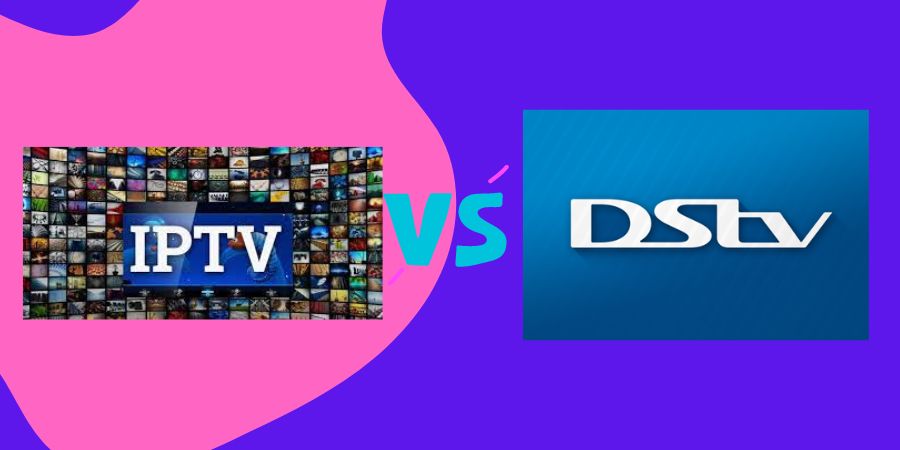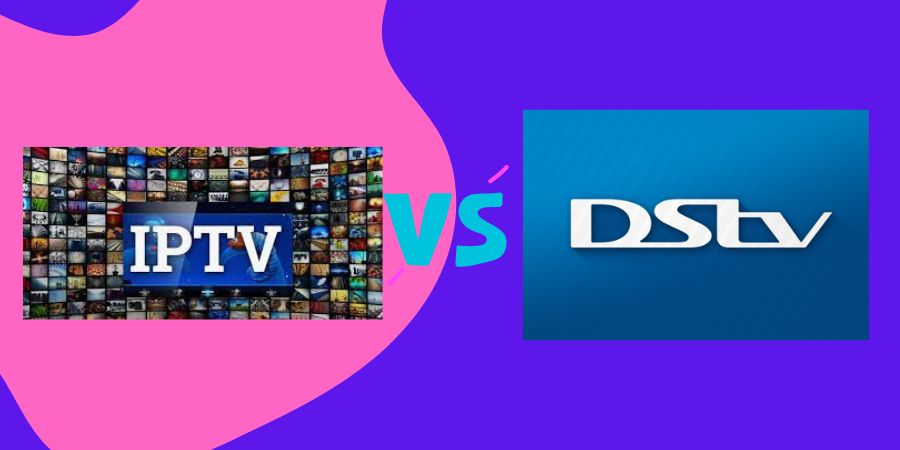If you’re considering switching to a new television service or exploring alternative options, you may have come across two popular choices: IPTV and DStv. While both offer an extensive range of entertainment, they differ in various aspects.
In this blog post, we’ll highlight 10 key differences between IPTV and DStv to help you make an informed decision. Let’s dive in!
IPTV vs. DStv: Comparison table
| IPTV | DStv | |
|---|---|---|
| Access | Delivered over the internet | Satellite broadcasting system |
| Content | Wide range of global content options | Local and international channels |
| Customization | Personalized channel selection and playlists | Predefined program lineups and bundled packages |
| Equipment | Requires stable internet and compatible devices | Satellite dish installation and provided decoder |
| Picture Quality | Offers HD and UHD content | Offers HD content with limited UHD options |
| Multi-Device Access | Watch on various devices | Primarily focused on traditional TV viewing |
| On-Demand | Extensive on-demand content libraries | Limited on-demand selection |
| Additional Features | Interactive features, add-ons, and customization | Service-related add-ons and features like recording |
| Cost | Flexible pricing models based on selected content | Bundled packages with different pricing tiers |
| Geographic Availability | Accessible globally | Primarily available in specific regions and countries |
10 Differences between IPTV and DStv

1. Access and Availability: Open the Gates to Endless Content
IPTV: A World of Digital Delights
With IPTV (Internet Protocol Television), you can enjoy an abundance of content from around the world. Simply put, it’s TV delivered over the internet. From live TV channels, on-demand movies, and series to catch-up services, IPTV provides access to a vast array of entertainment options.
DStv: Traditional Broadcasting with a Twist
DStv, on the other hand, operates on a traditional satellite broadcasting system. It offers a comprehensive range of channels, including local and international content. However, it primarily focuses on delivering pre-programmed content rather than the flexibility and variety offered by IPTV.
2. Content Flexibility: Tailoring Entertainment to Your Tastes
IPTV: Your Personalized Viewing Experience
IPTV allows you to customize your content based on your preferences. You can select specific channels, create personalized playlists, and access on-demand libraries. With features like time-shifted TV and pause, rewind, or fast-forward options, you have greater control over your viewing experience.
DStv: Pre-Defined Program Lineups
DStv offers curated program lineups with scheduled broadcasts. While you can choose from various packages to match your interests, the content lineup is predetermined. It provides a more traditional television experience with predefined shows and channels.
3. Equipment and Installation: Embracing the Digital Revolution
IPTV: Embracing the Future To access
IPTV, you need a stable internet connection and a compatible device, such as a Smart TV, smartphone, or streaming box. The installation process is relatively straightforward, and you have the freedom to choose the equipment that suits your needs.
DStv: Satellite Connection
DStv relies on a satellite dish to receive signals, which requires professional installation. You’ll need to set up the dish and connect it to the decoder provided by the service. This traditional setup may involve additional costs and limitations in terms of equipment placement.
4. Cost and Pricing Models: Finding the Right Fit for Your Wallet
IPTV: Pay for What You Watch IPTV services often offer flexible pricing models, allowing you to choose the channels and content you want to pay for. You can select from various subscription plans, catering to different budgets and preferences. It’s a more cost-effective option if you want to tailor your TV experience and avoid paying for channels you rarely watch.
DStv: Bundled Packages DStv offers bundled packages, which include a set number of channels and services. While it provides a wide range of content options, you may end up paying for channels that don’t align with your interests. However, DStv also offers different package tiers to cater to varying budgets.
5. Geographic Limitations: Breaking Boundaries or Staying Local
IPTV: Crossing Borders Digitally
One significant advantage of IPTV is its global accessibility. As long as you have an internet connection, you can access IPTV services from anywhere in the world. This makes it ideal for travelers, expats, or those seeking content beyond their local boundaries.
DStv: Localized Broadcasting
DStv is primarily available in specific regions and countries. While it may offer some international channels, its focus is often on local and regional content. If you prefer to stay connected with local programming, DStv can be a suitable choice.
6. Content: Enhancing Visual Experience
IPTV: Embrace the Clarity
IPTV providers often offer a wide range of channels and on-demand content in high definition (HD) and even ultra-high definition (UHD). This means you can enjoy stunning visuals and immersive viewing experiences, provided you have a compatible device and a strong internet connection.
DStv: HD Channels Galore
DStv also offers a selection of high-definition channels, allowing you to enjoy crisper images and vibrant colors. However, access to UHD content may be limited compared to IPTV. It’s worth considering if you prioritize exceptional picture quality.
7. Interactive Features: Engage and Interact with Your Content
IPTV: Dive into Interactive Features
IPTV services often include interactive features that enhance your engagement with the content. This can include features like interactive TV guides, personalized recommendations, voting for live shows, and even interactive advertisements. It adds an interactive element to your TV experience, making it more engaging and dynamic.
DStv: Traditional Viewing Experience
DStv primarily focuses on delivering traditional broadcasting content, which means interactive features may be limited. While you can navigate through channels and access program guides, the level of interactivity is generally more streamlined compared to IPTV.
8. On-Demand Content Libraries: Unlocking the World of Entertainment
IPTV: Endless On-Demand Options
One of the major advantages of IPTV is its vast library of on-demand content. You can access movies, TV series, documentaries, and more at any time. With IPTV, you’re not limited to scheduled broadcasts, giving you the freedom to watch what you want, when you want it.
DStv: Limited On-Demand Selection
DStv does offer some on-demand content, but its library may be more limited compared to IPTV. While you can catch up on missed episodes or select movies from a catalog, the range of choices may not be as extensive as what IPTV providers offer.
9. Multi-Device Access: Watch Anywhere, Anytime
IPTV: Flexibility at Your Fingertips
With IPTV, you can access your favorite content on multiple devices. Whether you’re at home or on the go, you can enjoy your preferred shows and channels on your smartphone, tablet, laptop, or Smart TV. This flexibility ensures you never miss out on your entertainment, no matter where you are.
DStv: Traditional TV Viewing
DStv primarily revolves around a traditional TV viewing experience, centered on a dedicated decoder connected to your television. While you can access some content on the DStv app, the full range of features and channels may not be available across all devices.
10. Additional Features and Add-Ons: Enhancing Your Viewing Experience
IPTV: Explore Value-Added Features
IPTV providers often offer additional features and add-ons to enhance your viewing experience. This can include features like parental controls, multi-screen viewing, video-on-demand packages, and premium content options. These extras allow you to customize your service further and tailor it to your preferences.
DStv: Service-Related Add-Ons
DStv provides various service-related add-ons, such as Explora decoders for advanced features like recording, pausing, and rewinding live TV. Additionally, you can opt for specific channel bouquets or thematic add-ons like sports packages. These additions enhance your DStv experience within the framework of traditional broadcasting.
FAQs: IPTV vs. DStv – Answering Your Burning Questions
Q1: What is IPTV?
A1: IPTV stands for Internet Protocol Television, which is a TV service delivered over the internet. It offers a wide range of live TV channels, on-demand content, and interactive features, providing a flexible and personalized viewing experience.
Q2: What is DStv?
A2: DStv is a popular satellite television service that delivers a comprehensive selection of channels, including local and international content. It operates on a traditional broadcasting system and offers pre-programmed content packages.
Q3: Can I access IPTV from anywhere in the world?
A3: Yes! IPTV services can be accessed from anywhere with an internet connection. It’s ideal for travelers, expats, or anyone seeking global content options.
Q4: What equipment do I need for IPTV and DStv?
A4: For IPTV, you’ll need a stable internet connection and a compatible device like a Smart TV, smartphone, or streaming box. DStv requires a satellite dish installation and a decoder provided by the service.
Q5: Can I customize my channel lineup with IPTV and DStv?
A5: With IPTV, you have more flexibility to customize your channel lineup, create personalized playlists, and access on-demand libraries. DStv offers predefined program lineups based on bundled packages, although it provides different package options to cater to various preferences.
Q6: Which service offers a better picture quality?
A6: Both IPTV and DStv offer high-definition (HD) channels. However, IPTV services may also provide ultra-high definition (UHD) content, resulting in a more visually immersive experience.
Q7: Can I watch content on multiple devices with IPTV and DStv?
A7: IPTV allows you to watch content on multiple devices such as smartphones, tablets, laptops, and Smart TVs, providing flexibility and convenience. DStv primarily revolves around traditional TV viewing, although limited content is available on the DStv app.
Q8: Are there additional features or add-ons available?
A8: IPTV services often offer additional features like parental controls, multi-screen viewing, and premium content options. DStv provides service-related add-ons such as Explora decoders for advanced features like recording and pausing live TV, as well as thematic add-ons like sports packages.
Q9: Which service is more cost-effective?
A9: IPTV services often offer flexible pricing models, allowing you to pay for the channels and content you want. This can be more cost-effective if you prefer a tailored TV experience. DStv offers bundled packages with different tiers to accommodate various budgets.
Q10: Can I access on-demand content with IPTV and DStv?
A10: IPTV services provide extensive on-demand content libraries, giving you access to movies, TV series, and more at any time. DStv also offers some on-demand content, but the selection may be more limited compared to IPTV.

